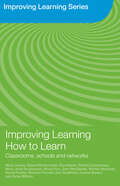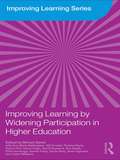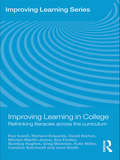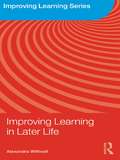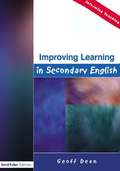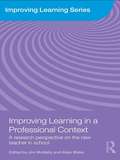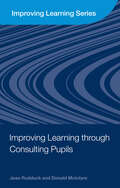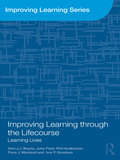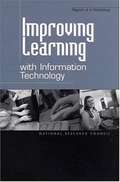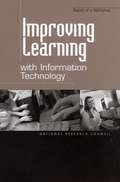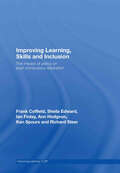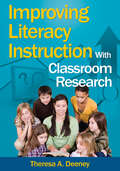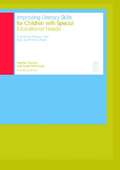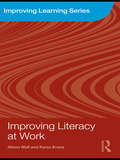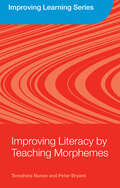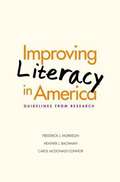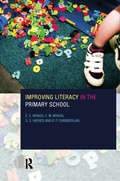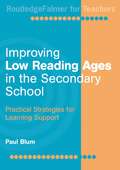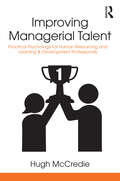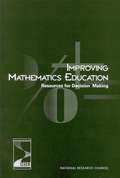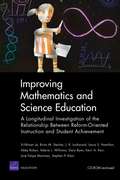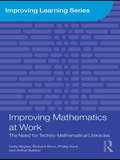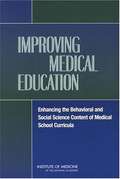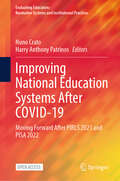- Table View
- List View
Improving Learning How to Learn: Classrooms, Schools and Networks (Improving Learning)
by Mary James Sue Swaffield Dylan Wiliam Paul Black Robert McCormick Joanna Swann Patrick Carmichael Bethan Marshall John MacBeath Alison Fox Richard Procter Mary-Jane Drummond David PedderLearning how to learn is an essential preparation for lifelong learning. Whilst this is widely acknowledged by teachers, they have lacked a rich professional knowledge base from which they can teach their pupils how to learn. This book makes a major contribution to the creation of such a professional knowledge base for teachers by building on previous work associated with ‘formative assessment’ or ‘assessment for learning’ which has a strong evidence base, and is now being promoted nationally and internationally. However, it adds an important new dimension by reporting the conditions within schools, and across networks of schools, that are conducive to the promotion, in classrooms, of learning how to learn as an extension of assessment for learning. There is a companion book, Learning How to Learn in Classrooms: Tools for schools (also available from Routledge), which provides practical resources for those teachers looking to put into practice the principles covered in this book.
Improving Learning by Widening Participation in Higher Education (Improving Learning)
by Ann-Marie Bathmaker Sue Heath Pauline Davis Julian Williams Diane Reay Gill Crozier Anna Vignoles Geoff Hayward Gareth Parry Miriam David Alison Fuller Hubert Ertl Chris HockingsImproving Learning by Widening Participation in Higher Education presents a strong and coherent rationale for improving learning for diverse students from a range of socio-economic, ethnic/racial and gender backgrounds within higher education, and for adults across the life course. Edited by Miriam David, the Associate Director of the ESRC’s highly successful Teaching and Learning Research Programme, with contributions from the seven projects on Widening Participation in Higher Education (viz Gill Crozier and Diane Reay; Chris Hockings; Alison Fuller and Sue Heath; Anna Vignoles; Geoff Hayward and Hubert Ertl; Julian Williams and Pauline Davis; Gareth Parry and Ann-Marie Bathmaker), this book provides clear and comprehensive research evidence on the policies, processes, pedagogies and practices of widening or increasing participation in higher education. This evidence is situated within the contexts of changing individual and institutional circumstances across the life course, and wider international transformations of higher education in relation to the global knowledge economy. Improving Learning by Widening Participation in Higher Education also considers: the changing UK policy contexts of post-compulsory education; how socio-economically disadvantaged students – raced and gendered – fare through schools and into post-compulsory education; the kinds of academic and vocational courses, including Maths, undertaken; the changing forms of institutional and pedagogic practices within higher education; how adults view the role of higher education in their lives. This book, based upon both qualitative studies and quantitative datasets, offers a rare insight into the overall implications for current and future policy and will provide a springboard for further research and debate. It will appeal both to policy-makers and practitioners, as well as students within higher education.
Improving Learning in College: Rethinking Literacies Across the Curriculum (Improving Learning)
by David Barton Richard Edwards Kate Miller Roz Ivanic Marilyn Martin-Jones June Smith Zoe Fowler Buddug Hughes Greg Mannion Candice SatchwellWhat's the problem with literacy at college? How might everyday literacy be harnessed for educational ends? Based on the first major study of literacy practices in colleges in the UK, this book explores the reading and writing associated with learning subjects across the college curriculum. It investigates literacy practices in which students engage outside of college, and teaching and learning strategies through which these can help support the curriculum. With insightful analyses of innovative practices, it considers ways of changing teaching practices to enable students to draw upon their full potential. Recent research work has challenged the myth of individual student deficit, arguing cogently that people have ‘funds of knowledge’ from diverse and vibrant cultural roots, and that these have been misguidedly disqualified by the education system. It has claimed that different ‘ways with words’ can provide valuable resources for learning. However, the empirical exploration of this claim has lagged far behind the theoretical debate. Improving Learning in College resolves this by showing the integrity and richness of the literacy practices of a significant population, not previously the focus of such research: those who take vocational and academic college courses in colleges. It addresses an issue which has not until now been developed within this research tradition: that of how these practices can not only be valued and validated, but mobilised and harnessed to enhance learning in educational settings. This book will interest all teachers, teacher-educators and researchers concerned with post-compulsory education and vocational education in compulsory schooling.
Improving Learning in Later Life (Improving Learning)
by Alexandra WithnallWith life expectancy increasing, there is growing emphasis on encouraging older people to continue learning. This comes as part of a strategy to allow them to remain healthy, independent and vitally engaged in society for as long as possible. All the same, policymakers have barely begun to address the issues involved and the perspectives of these learners. This book presents insightful research that will help shift the focus of debate onto the learning experiences of older people themselves. It offers a critical overview of the development of theoretical and philosophical approaches to later life learning that have developed over the last three decades, drawing on published work from the USA, the UK, Australia and other countries. It documents the individual experiences of older people through a variety of methods, including: Focus group discussions Learning diaries kept by older people Questionnaires considering, among other issues, older people’s definition on what learning is Interviews and commentary This material gives a sense of the breadth and diversity of older people’s experiences, as well as the enormous range of learning activities, both informal and formal, in which they are engaged in retirement. In a climate of debate and change concerning the provision and funding of non-vocational learning opportunities for adults of any age, this study’s findings will be of particular importance. It will appeal to researchers and students of education as well as those directly involved in the implementation of courses and classes involving older learners.
Improving Learning in Secondary English (Informing Teaching)
by Geoff DeanFocusing on how teachers can improve the ways in which they plan their lessons, this book demonstrates how careful planning allows the further development of learning approaches. The author presents a clear understanding of how these approaches can be used by the teacher to assess themselves and their students’ learning through: careful consideration of how certain approaches to learning can improve a student’s grasp of reading, writing, speaking and listening discussions on how theories and research from leading experts can be applied in the classroom advice on how to use government strategies and ultimately work beyond them to develop learning in the classroom an examination of learning for children of different abilities. Helping teachers to develop good practice and understanding of learning in a familiar subject context, this book is essential for all those concerned in the teaching of secondary English.
Improving Learning in a Professional Context: A Research Perspective on the New Teacher in School (Improving Learning)
by Jim McNally Allan BlakeImproving Learning in a Professional Context provides vital new evidence on exactly how teachers learn to be teachers; evidence that is likely to affect and influence the profession for many years to come. Demonstrating that learning in schools is more than simple ‘cognitive’ knowledge of the curriculum and teaching skills, this book suggests that we need to pay more attention to the emotional, relational, ethical, material, structural and temporal dimensions of the teaching experience. Based on empirical research, including interviews with new teachers, by teachers themselves, on a scale rarely seen before, the book reveals the complexity of learning in a professional context and gives some basic truths about what really matters in teaching. This book offers a fundamental critique of policy but also the prospect of constructive change for the better as the authors present accounts of what the ‘real’ experience of beginning teaching may be like, as well as lines for future research. Key questions are answered, such as: Do we really understand what beginners go through in the workplace? What is the experience of new teachers as they join one of the largest workforces in the developed world? What do teachers learn in the school, one of our universal institutions? Becoming a teacher is a transformative search by individuals for their teaching identities and, with this book, teachers and teacher educators can at last begin to understand this complex developmental process. IMPROVING LEARNING SERIES The Improving Learning series supports evidence-informed professional practice and policy-making in education. Each book showcases findings from the Teaching and Learning Research Programme (TLRP) - one of the world’s largest coordinated educational research initiatives. For those with a commitment to the improvement of outcomes for learners, these books are essential reading.
Improving Learning through Consulting Pupils (Improving Learning)
by Jean Rudduck Donald McIntyrePupil consultation can lead to a transformation of teacher-pupil relationships, to significant improvements in teachers' practices, and to pupils having a new sense of themselves as members of a community of learners. In England, pupil involvement is at the heart of current government education policy and is a key dimension of both citizenship education and personalised learning. Drawing on research carried out as part of the Teaching and Learning Research Programme, Improving Learning through Consulting Pupils discusses the potential of consultation as a strategy for signalling a more partnership-oriented relationship in teaching and learning. It also examines the challenges of introducing and sustaining consultative practices. Topics covered include: the centrality of consultation about teaching and learning in relation to broader school level concerns; teaching approaches that pupils believe help them to learn and those that obstruct their learning; teachers' responses to pupil consultation - what they learn from it, the changes they can make to their practice and the difficulties they can face; the things that can get in the way of pupils trusting in consultation as something that can make a positive difference. While consultation is flourishing in many primary schools, the focus here is on secondary schools where the difficulties of introducing and sustaining consultation are often more daunting but where the benefits of doing so can be substantial. This innovative book will be of interest to all those concerned with improving classroom learning.
Improving Learning through the Lifecourse: Learning Lives (Improving Learning)
by Gert Biesta John Field Ivor F. Goodson Phil Hodkinson Flora J. MacleodAdult learning matters. There is now widespread agreement that modern countries depend on the creativity, skills and knowledge of the entire population for their prosperity. Many people talk of our future well-being in terms of a ‘knowledge economy’ or a ‘learning society’ in which every person’s ability to develop new capabilities will provide them with resources that will help them and the wider community to adapt and thrive. While in theory this makes lifelong learning into an exciting prospect, in practice this broad agenda is often reduced to a narrowly economic conception. This book reports on one of the largest research projects into lifelong learning conducted in recent years. Through over 500 in-depth interviews with a cohort of about 120 adults who were followed for three years, the Learning Lives project has built up a detailed understanding of what learning means and does in the lives of adults. The project has generated insights in how learning has changed over time and across generations, what the connections are with the changing world of work, what differences learning makes for life chances, how we can learn from life and for life, and how people’s prospects of learning can be improved. Combining life history and life-course research with analysis of longitudinal survey data, this book provides important insights into the learning biographies and trajectories of adults. The book shows that learning means and does much more in people’s lives than is often acknowledged by current education policy and politics. In doing so, it is an invaluable resource for anyone with an interest in the role and potential of learning through the lifecourse.
Improving Learning with Information Technology: Report of a Workshop
by Steering Committee on Improving Learning Information TechnologyA report on Improving Learning with Information Technology
Improving Learning with Information Technology: Report of a Workshop
by National Research CouncilIn spring 2000, representatives from the U. S. Department of Education (DOEd) and senior staff at the National Research Council (NRC) recognized a common frustration: that the potential of information technology to transform K-12 education remains unrealized. In fall 2000 the U. S. DOEd formally requested that the National Academies undertake an interdisciplinary project called Improving Learning with Information Technology (ILIT). The project was launched with a symposium on January 24-25, 2001. This report summarizes the proceedings of the symposium and is intended for people interested in considering better strategies for using information technology in the educational arena. While it offers insights from the presenters on both the challenges to and the opportunities for forging a better dialogue among learning scientists, technologists, and educators, it does not contain conclusions or recommendations. Rather, it highlights issues to consider, constituents to engage, and strategies to employ in the effort to build a coalition to harness the power of information technologies for the improvement of American education. Every effort has been made to convey the speakers' content and viewpoints accurately. Recognizing the speculative nature of many of the speaker contributions, most attributions identify a speaker by area of expertise rather than by name. The report reflects the proceedings of the workshop and is not intended to be a comprehensive review of all the issues involved in the project to improve learning with information technology.
Improving Learning, Skills and Inclusion: The Impact of Policy on Post-Compulsory Education (Improving Learning)
by Frank Coffield Ann Hodgson Ken Spours Sheila Edward Ian Finlay Richard SteerHow can opportunities for teaching and learning be improved to ensure that many more people participate, gain qualifications and obtain decent jobs? Will government policies enable us to achieve these goals? What new ideas do we need to ensure a more inclusive, equitable and efficient learning system? These are some of the main concerns which underlie this thought-provoking book coming from a major research project looking at how policies affect learners, tutors, managers and institutional leaders in Further Education Colleges, Adult and Community Learning centres and in Work Based Learning sites. Post compulsory education in the UK has been constantly restructured by the New Labour government and has been subject to considerable policy turbulence over the last few years. This book attempts to understand this important but poorly understood sector by both talking to students and front-line staff and by interviewing the officials responsible for managing post-compulsory education and lifelong learning. By examining the sector simultaneously from the ‘bottom up’ and from ‘top down’, the authors show how recent policy is affecting three disadvantaged groups - 16-19 year olds who have fared poorly in official tests at school; unemployed adults learning basic skills; and employees at work learning basic skills. The authors conclude that there are serious failings and suggest principles and features of a more equitable and effective learning system.
Improving Literacy Instruction With Classroom Research
by Theresa A. DeeneyThe author details the classroom research cycle and provides tools and sample completed projects to help educators initiate their own research and improve literacy instruction.
Improving Literacy Skills for Children with Special Educational Needs: A Guide To Helping In The Early And Primary Years
by Sarah Parkhouse Heather DuncanThis practical book, written by experienced practitioners, will help teachers of pupils with Special Educational Needs assess, record and improve the literacy skills of their pupils. The creation of the National Literacy Strategy and the Literacy Hour has put additional demands upon teachers, particularly those concerned with Special Needs.The book covers all aspects of literacy development through the Early and Primary Years including early skills, reading, phonological skills, writing, spelling and handwriting. This resource pack includes advice and ideas on record keeping with Individual Education Plans, assessing pupils' skills and strategies for future learning.It contains photocopiable checklists and assessment sheets for both teacher and pupil to complete and has clear child-friendly illustrated worksheets throughout. An indispensable resource for all classrooms.
Improving Literacy at Work (Improving Learning)
by Alison Wolf Karen EvansModern societies demand high levels of literacy. The written word is pervasive; individuals with poor literacy skills are deeply disadvantaged; and governments are increasingly pre-occupied with the contribution that skills can make to economic growth. As a result, the basic skills of adult workers are of concern as never before, a focus for workplace and education policy and practice. While Improving Literacy at Work builds on detailed research from the UK, the issue is a universal one and rising skill requirements mean the conclusions drawn will be of equal interest elsewhere in Europe, USA, Canada, Australia and New Zealand. The research findings have very direct implications and practical relevance for teaching and learning, as this valuable book demonstrates, providing clear advice on how to develop effective provision and how best to support learners at work. Throughout the study, the authors address the following fundamental questions: How do adults’ literacy skills impact on their working lives, and on the enterprises where they work? How can we develop these essential skills in the workforce? When and how can literacy instruction change individuals’ employability and engagement with further learning? Essential reading for trainers and managers in industry, teachers, researchers and lecturers in adult and further education and stakeholders implementing evidence-based policy, this book maps the fundamental changes taking place in workplace literacy.
Improving Literacy by Teaching Morphemes (Improving Learning)
by Peter Bryant Terezinha NunesWith reports from several studies showing the benefits of teaching young children about morphemes, this book is essential reading for anyone concerned with helping children to read and write. By breaking words down into chunks of meaning that can be analyzed as complete units rather than as strings of individual letters, children are better able to make sense of the often contradictory spelling and reading rules of English. As a result, their enjoyment of learning about words increases, and their literacy skills improve. Written by leading researchers for trainee teachers, practising teachers and interested parents, this highly accessible and innovative book provides sound, evidence-based advice and materials that can be used to help teach children about morphemes, and highlights the beneficial effects of this approach.
Improving Literacy in America: Guidelines from Research
by Frederick J. Morrison Heather J. Bachman Carol Mcdonald ConnorAn alarmingly high number of American students continue to lack proficiency in reading, math, and science. The various attempts to address this problem have all too often resulted in "silver bullet" solutions such as reducing class size or implementing voucher programs. But as the authors of this critically important book show, improving literacy also requires an understanding of complex and interrelated social issues that shape a child's learning. More than twenty years of research demonstrate that literacy success is determined by a combination of sociocultural forces including parenting, preschool, classroom instruction, and other factors that have a direct impact on a child's development. Here, Frederick J. Morrison, Heather J. Bachman, and Carol McDonald Connor present the most up-to-date research on the diverse factors that relate to a child's literacy development from preschool through early elementary school. Urging greater emphasis on the immediate sources of influence on children, the authors warn against simple, single solutions that ignore other pivotal aspects of the problem. In a concluding chapter, the authors propose seven specific recommendations for improving literacy--recommendations that can make a real difference in American education.
Improving Literacy in the Primary School
by Prof E Wragg E. C. Wragg G. S. Haynes R. P. ChamberlinOne of the most important challenges teachers face is making sure children can read. It is an absolutely crucial skill, and current educational policy is giving it a very high priority.Based on one of the largest studies ever undertaken of what primary schools do to improve literacy, this book reports what Professor Ted Wragg and his research team found.The importance placed on literacy has never been greater. When children learn to read, they are laying the foundations for their entire educational future. Effective teachers can make a huge difference, as a poor start can hinder children throughout their schooling and beyond.By looking at what actually goes on in classrooms, this volume provides an invaluable insight into what happens to children and how their reading progresses. It shows how particular teachers manage the improvement of their pupils' reading levels, and also follows individual pupils through a school year.This is a very readbale account of a fascinating and crucial area of research that is highly topical. Every class teacher should read it.
Improving Low-Reading Ages in the Secondary School: Practical Strategies for Learning Support
by Paul BlumThis highly practical guide shows how learning support teachers and assistants can work effectively with secondary school pupils who are struggling with their reading. It relates directly to the working practices of teachers, steering them through issues such as: assessing the low-age reader working with reading withdrawal groups finding and creating resources for low-age readers constructing spelling strategies to support reading understanding the emotional dimension to being a poor reader how to effectively involve parents. Paul Blum offers valuable advice on how to make challenging mainstream subject textbooks accessible to low-aged readers and help on where to find good free resources as well as commercial materials to suit them. Exploring the vital relationship between the mainstream and learning support function, he also outlines the ways in which the two can be harnessed to make a significant difference to reading improvement.
Improving Managerial Talent: Practical Psychology for Human Resourcing and Learning & Development Professionals
by Hugh McCredieAimed at senior HRM and L&D specialists responsible for improving their organisation’s managerial talent, Improving Managerial Talent covers the core findings of the author’s and other published research. It provides a highly participative overview of personality and ability psychometrics, involving the opportunity for self-application. It reveals hard evidence of the extent to which such tests can add value to the prediction of managerial success and their link to requisite competencies. It shows how qualified testers, HR and line managers can each make a unique contribution to the selection process. The book goes on to show how management style is a product of personality and habit and how the acquisition and use of a complementary style can improve persuasiveness and the cultivation of interpersonal skill both for the manager and for those whom the manager might need to coach. It regards job-challenge as the primary engine of managerial growth, both for development in key result areas and for underlying personal competencies. The book provides the reader with some self-insights and an appreciation of validated, powerful, often in-house, methods for selecting and developing better managers. The methods on offer have been validated on a population of over 400 directors of small to medium-sized business units. They include a generic psychometric algorithm for the selection of managers, some unique findings on styles of managing, coaching and persuading based upon close observation of over 200 senior managers and a distinctive and powerful approach to developing interpersonal skills by (1) practice, (2) demonstration of alternatives and (3) reflection.
Improving Mathematics Education: Resources for Decision Making
by Committee on Decisions That CountA report on Improving Mathematics Education
Improving Mathematics and Science Education
by Brian M. Stecher Laura S. Hamilton Vi-Nhuan Le J. R. Lockwood Abby RobynPresents the findings of a multiyear study of the effectiveness of reform-oriented science and mathematics teaching (instructional practices for engaging students actively in their own learning and enhancing the development of complex cognitive skills)-specifically, whether such practices are associated with higher student achievement and whether that association is sensitive to the aspects of achievement that are measured. (CD-ROM enclosed.)
Improving Mathematics at Work: The Need for Techno-Mathematical Literacies (Improving Learning)
by Celia Hoyles Arthur Bakker Richard Noss Phillip KentImproving Mathematics at Work questions the mathematical knowledge and skills that matter in the twenty-first century world of work, and studies how the use of mathematics in the workplace is evolving in the rapidly-changing context of new technologies and globalisation. Through a series of case studies from the manufacturing and financial service sectors, the authors argue that there has been a radical shift in the type mathematical skills required for work – a shift not yet fully recognised by the formal education system, or by employers and managers. Examining how information technology has changed mathematical requirements, the idea of Techno-mathematical Literacies (TmL) is introduced to describe the emerging need to be fluent in the language of mathematical inputs and outputs to technologies and to interpret and communicate with these, rather than merely to be procedurally competent with calculations. The authors argue for careful analyses of workplace activities, looking beyond the conventional thinking about numeracy, which still dominates policy arguments about workplace mathematics. Throughout their study, the authors answer the following fundamental questions: What mathematical knowledge and skills matter for the world of work today? How does information technology change the necessary knowledge and the ways in which it is encountered? How can we develop these essential new skills in the workforce? With evidence of successful opportunities to learn with TmL that were co-designed and evaluated with employers and employees, this book provides suggestions for the development of TmL through the use of authentic learning activities, and interactive software design. Essential reading for trainers and managers in industry, teachers, researchers and lecturers of mathematics education, and stakeholders implementing evidence-based policy, this book maps the fundamental changes taking place in workplace mathematics.
Improving Measurement of Productivity in Higher Education
by Teresa A. SullivanHigher education is a linchpin of the American economy and society: teaching and research at colleges and universities contribute significantly to the nation's economic activity, both directly and through their impact on future growth; federal and state governments support teaching and research with billions of taxpayers' dollars; and individuals, communities, and the nation gain from the learning and innovation that occur in higher education. In the current environment of increasing tuition and shrinking public funds, a sense of urgency has emerged to better track the performance of colleges and universities in the hope that their costs can be contained without compromising quality or accessibility. Improving Measurement of Productivity in Higher Education presents an analytically well-defined concept of productivity in higher education and recommends empirically valid and operationally practical guidelines for measuring it. In addition to its obvious policy and research value, improved measures of productivity may generate insights that potentially lead to enhanced departmental, institutional, or system educational processes. Improving Measurement of Productivity in Higher Education constructs valid productivity measures to supplement the body of information used to guide resource allocation decisions at the system, state, and national levels and to assist policymakers who must assess investments in higher education against other compelling demands on scarce resources. By portraying the productive process in detail, this report will allow stakeholders to better understand the complexities of--and potential approaches to--measuring institution, system and national-level performance in higher education.
Improving Medical Education: Enhancing the Behavioral and Social Science Content of Medical School Curricula
by Institute of Medicine of the National AcademiesRoughly half of all deaths in the United States are linked to behavioral and social factors. The leading causes of preventable death and disease in the United States are smoking, sedentary lifestyle, along with poor dietary habits, and alcohol consumption. To make measurable improvements in the health of Americans, physicians must be equipped with the knowledge and skills from the behavioral and social sciences needed to recognize, understand, and effectively respond to patients as individuals, not just to their symptoms. What are medical schools teaching students about the behavioral and social sciences? In the report, the committee concluded that there is inadequate information available to sufficiently describe behavioral and social science curriculum content, teaching techniques, and assessment methodologies in U.S. medical schools and recommends development of a new national behavioral and social science database. The committee also recommended that the National Board of Medical Examiners ensure that the U.S. Medical Licensing Examination adequately cover the behavioral and social science subject matter recommended in this report.
Improving National Education Systems After COVID-19: Moving Forward After PIRLS 2021 and PISA 2022 (Evaluating Education: Normative Systems and Institutional Practices)
by Harry Anthony Patrinos Nuno CratoThis open access book compares and analyses the results in twelve countries of the two latest international student assessments: Progress in International Reading Literacy Study 2021 (PIRLS) and the Programme for International Student Assessment 2022 (PISA) and tries to disentangle the effects of the pandemic from the long term trends in education. It is one of the first, or maybe the first, published volumes to provide a global assessment of the devastating impact of the COVID-19 pandemic on student learning as measured by independent international comparative surveys. The 12 countries discussed in this volume represent a wide variety of educational systems – including Chile, Ecuador, England, Estonia, Italy, the Netherlands, Poland, Portugal, South Africa, Spain, and the United States. It compiles diverse scenarios including countries that are high performers; countries that perform at the OECD mean; and countries that are struggling to attain the OECD average. Each country has its history that reflects efforts to cope with pandemic school closures and to improve educational achievement. A major topic discussed in this edited volume is related to understanding the diverse circumstances for the variations in results within different countries: Why did learning loss in specific locations? How much learning was lost? Why is a country continuously declining? Why is another country constantly improving? Why is there higher or less levels of inequality? How is a country regularly improving with an outdated curriculum? Which policies have worked, and which ones have not? What can we do now? This book is a valuable contribution to answer these concerns based on a diverse sample of countries and research questions.
